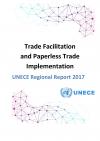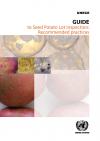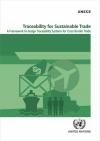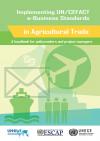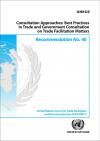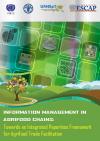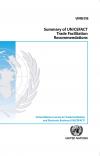Publications
Displaying Results 81 - 100 of 281
- English
This Publication (ECE/TRADE/440) advocates for integrating education about standardization into the curricula of educational establishments. It presents evidence of the relevance of standards for policymakers and business executives as well as professionals. It then reviews the efforts of UNECE since 2012 to date to improve education about
- English
As the second most polluting industry, the textile sector is responsible for a large portion of the world’s CO2 emissions and industrial waste, not to mention the exploitation of “indecent” working conditions. At the same time, the industry has a complex value chain, with production facilities located all over the world, which makes it very hard to gain accurate information about sources and
- English
Within the United Nations Economic Commission for Europe (UNECE), the United Nations Centre for Trade Facilitation and Electronic Business (UN/CEFACT) has developed a series of some 30 recommendations and standards that are used worldwide to simplify, standardize and harmonize trade procedures and information flows. Many of these are now international standards of the International
- English
The Economic Commission for Europe (UNECE) has a long history of offering trade facilitation guidance, especially on the topic of Single Window. Since its emergence in 2004, Recommendation 33 on implementing a Single Window has been widely received as the reference on the subject and is used as the basis for many other organizations’ work as well as the cornerstone of many national
- English
Recommendation 42 on Trade and Transport Facilitation Monitoring Mechanisms (TTFMM) addresses issues related to institutional arrangements and methodology in designing and implementing TTFMM. It is an important contribution to UNECE’s suite of Trade Facilitation recommendations and guidance material.Download the Publication ECE/TRADE/
- English
Since the introduction in 1973 as the UNECE Recommendation No. 1, the UN Layout Key (UNLK) has provided Governments, organizations and the business community with a basis for a standard and aligned design of documents used in trade and transport. This has led to a major improvement in the standardization of trade documents in many countries throughout the world.Most international organizations
- English
The Explanatory Brochure on the Standard for Sweet Peppers has been developed to harmonize the interpretation of the Standard, thereby facilitating international as well as national trade. It addresses producers and traders, as well as inspection authorities. It corresponds to the latest edition of the UNECE Standard for Sweet Peppers (FFV-28), which was officially adopted in November 2009. In
- English
Facilitating trade is about streamlining and simplifying international trade, particularly import and export procedures, transit requirements and procedures applied by Customs and other agencies (UNECE-UN/CEFACT). With the rapid increase of international trade, thanks in part to the reduction of tariffs and quotas, it has become evident that for countries to benefit from open global markets it
- English
A small landlocked country, the Republic of Moldova remains one of the poorest countries in South East Europe, with the economy showing continued dependence on low value-added manufacturing and agriculture along with remittances from workers abroad for income generation. The country is yet to reap the benefits of the intensive reform efforts, which have been
- English
Public-Private Partnerships (PPPs) is a possible solution for financing and implementing public projects. These projects allow the public sector to benefit from private sector funding, expertise and capacity while allowing the private sector to partner with the public sector in providing critical public services. There are a number of areas within Trade Facilitation
- English
This Guide refers to the UNECE STANDARD S-1, concerning the marketing and commercial quality control of Seed Potatoes. Knowledge of the relevant requirements is essential for the inspector.
Inspection is the visual examination of plants, tubers, containers, equipment or facilities by an authorized person, to determine compliance with regulations. Confirmation of symptoms can be supported by
- English
An upper-middle income country, Albania is in the process of implementing an all-encompassing reform effort to foster national competitiveness and achieve greater integration into global value chains.Driving these reforms is the imperative for fulfilling the requirements of the European Union (EU) Acquis Communautaire, which gained new life in 2014 when Albania
- English
The joint UNECE-OECD publication “International Regulatory Cooperation: the Case of the United Nations Economic Commission for Europe” presents the rule-making and standards-setting activities of UNECE.
It is illustrated by a number of examples that show how UNECE impacts our daily lives, including through:
- English
Consumers and producers are increasingly interested in knowing how products are made and whether there are any adverse environmental or social impacts. While two products may look or feel similar, consumers may still distinguish between them on the basis of certain intangible policy claims, such as whether they are “organic” or “sustainably produced”. Since these types of claims are difficult
- English
This Handbook presents a general framework for the design of of e-Business projects in the agrifood sector using open, international standards. It specifically looks at four e-Business standards developed by UN/CEFACT in the areas of:Electronic phytosanitary certificates; Electronic reporting of sustainable fishery management; Electronic exchange of laboratory
- English
Persimmons - Explanatory Brochure (ECE/TRADE/417)
The Explanatory Brochure on the Standard for Persimmons (ECE/TRADE/417) has been developed to harmonize the interpretation of the Standard, thereby facilitating international as well as national trade. It addresses producers and traders, as well as inspection authorities. It
- English
The purpose of Recommendation N°. 40 (ECE/TRADE/423) is to inform government agencies and private sector stakeholders about approaches to effective consultations that will be flexible, transparent, fair, accountable, and participatory. This Recommendation addresses issues such as
- English
International trade in agricultural and food products is more complex than trade in manufacturing – trade regulations are stricter, paperwork is more cumbersome and logistics are more complex. These elements are mainly required for ensuring food safety for consumers. Detailed information on traded goods alongside the movement of goods in a supply chain is critically
- English
This publication (ECE/TRADE/346/Rev.1) contains the latest information on trade facilitation recommendations established under the auspices of the United Nations Centre for Trade Facilitation and Electronic Business (UN/CEFACT). The publication provides a summary of the approved
- English
The aim of this bi-lingual Publication (ECE/TRADE/424) is to help bring voluntary standards into the toolbox of disaster risk reduction, including both by encouraging their use by business and by enhancing their role in regulatory practice and policy-making more generally. To this end, the paper







